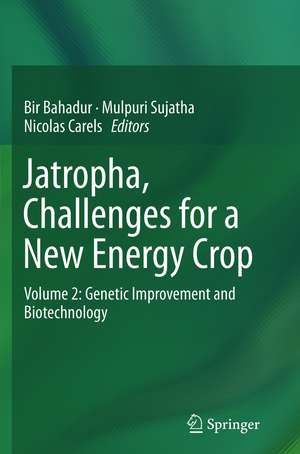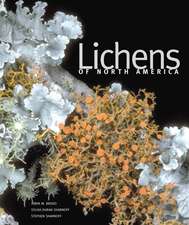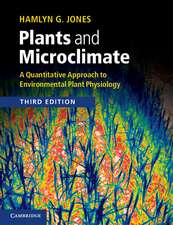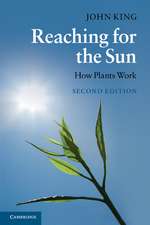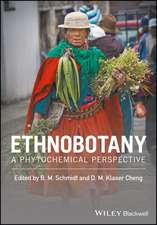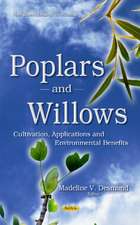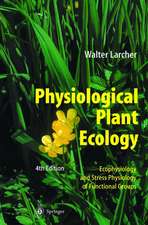Jatropha, Challenges for a New Energy Crop: Volume 2: Genetic Improvement and Biotechnology
Editat de Bir Bahadur, Mulpuri Sujatha, Nicolas Carelsen Limba Engleză Paperback – 27 ian 2015
| Toate formatele și edițiile | Preț | Express |
|---|---|---|
| Paperback (2) | 1232.09 lei 6-8 săpt. | |
| Springer – 27 ian 2015 | 1232.09 lei 6-8 săpt. | |
| Springer – 27 ian 2015 | 1232.71 lei 6-8 săpt. | |
| Hardback (2) | 1236.99 lei 6-8 săpt. | |
| Springer – 13 dec 2012 | 1236.99 lei 6-8 săpt. | |
| Springer – 13 dec 2012 | 1236.99 lei 6-8 săpt. |
Preț: 1232.71 lei
Preț vechi: 1503.31 lei
-18% Nou
Puncte Express: 1849
Preț estimativ în valută:
235.88€ • 246.78$ • 195.95£
235.88€ • 246.78$ • 195.95£
Carte tipărită la comandă
Livrare economică 02-16 aprilie
Preluare comenzi: 021 569.72.76
Specificații
ISBN-13: 9781489991720
ISBN-10: 1489991727
Pagini: 634
Ilustrații: XVIII, 614 p.
Dimensiuni: 155 x 235 x 33 mm
Greutate: 0.88 kg
Ediția:2013
Editura: Springer
Colecția Springer
Locul publicării:New York, NY, United States
ISBN-10: 1489991727
Pagini: 634
Ilustrații: XVIII, 614 p.
Dimensiuni: 155 x 235 x 33 mm
Greutate: 0.88 kg
Ediția:2013
Editura: Springer
Colecția Springer
Locul publicării:New York, NY, United States
Public țintă
ResearchCuprins
Section 1:Biology and Reproduction.- Laticifers of Jatropha.- Wood Anatomy of Indian Jatrophas.- Breeding System and Pollination in Jatropha curcas: An Overview.- Pollen of Jatropha L.: Taxonomic and Phylogenetic Considerations.- Embryology of Jatropha - A Review.- Structure and Development of Fruit and Seed of Jatropha gossypifolia l.- Fruit, Seed and Seedling characters in Jatrophas.- Genetic Improvement in Jatropha curcas through Selection and Breeding.- Section2:Genetic diversity of Jatropha and domestication.- Origin, domestication, distribution and diversity of Jatropha curcas L.- Systematics of Indian Jatropha L.- Economic and Medicinal Importance of Jatrophas.- Genetic Diversity of Jatropha curcas In Southern Mexico.- Relationship of the genetic diversity of Jatropha curcas in Brazil and worldwide.- Towards the Domestication of Jatropha: The Integration of Sciences.- Karyology and Genomics of Jatropha - Current Status and Future Prospects.- Studies on Jatropha curcas L and its improvement through induced mutation.- The use of EcoTILLING for the genetic improvement of Jatropha curcas L.- Comparative Genomics in Euphorbiaceae.- Proteomic perspectives on understanding and improving Jatropha curcas L.- Section 3:Jatropha germplasm.- Genetic Diversity, Molecular Markers and Marker Assisted Breeding in Jatropha.- Interspecific Hybridization in the Genus Jatropha.- Genetic Affinities of Jatropha with other Euphorbiaceous Taxa.- Jatropha germplasm manipulation in Brazil.- Conservation strategies and management of Jatropha germplasm.- Section 4:Biotechnology.- Micropropagation of Jatropha curcas for large scale multiplication of quality germplasm.- Jatropha tissue culture: A critical review on present scenario and future prospects.- Tissue culture studies of Jatropha species: A Review.- Genetic Transformation of Jatropha curcas: Current status and future prospects.- Improvement of Jatropha oil by genetic transformation.- Genomestructure of Jatropha curcas L.- Towards the Metabolomics of Jatropha curcas L.
Notă biografică
Bir Bahadur has graduated from Nizam College and Post-graduated from University college, Osmania University, Hyderabad India. He obtained his PhD in Plant Genetics from Osmania university and was closely associated with Prof. J.B.S. Haldane, FRS, the renowned Geneticist of last century. He advised, guided and encouraged him to study heterostyly and incompatibility in Indian plant species, a subject first studied by Charles Darwin in England about 160 years back. He made significant contributions in several areas of plant biology especially in incompatibility, mutagenesis, morphogenesis, tissue culture, and organism asymmetry.,application of SEM in plant sciences He published over 250 research papers, which are well received and quoted in national and international journals, including number of theses and several publications on Jatropha and Castor. He served Osmania and Kakatiya Universities as Lecturer, Reader and Professor, also served as Chairman, Head of Department, Dean of the Faculty of Science ,Kakatiya University,Warangal. He has taught the genetics, biotechnology and reproduction of plants for over 40 years and accumulated research experience in these areas for about 50 years. He was a Post-Doctoral Fellow at the Institute of Genetics of Hungarian Academy (Budapest), recipient of the Royal Society Bursary, London and Honorary Research Fellow at the Birmingham University (UK). He has been invited speaker of over 100 conferences including Max Plank Institute, Koln (Germany), Institute of Genetics (Budapest), Birmingham (UK), University Texas, Houstan (USA) and Missouri University, St Louis (USA), Sabrao conference, Szukoba, Tokyo (Japan), Indian Science Congress etc. He has authored / edited 8 books and was Chief Editor of both Proceedings of Andhra Pradesh Akademi of Sciences (Hyderabad, India) and Journal of Palynology (Lucknow, India). He is on the editorial boards of several Journals in India. He is recipient of Best TeacherAward by A.P. state Government and Prof. Vishwamber Puri, Gold Medal of Indian Botanical Society for his original contributions in various aspects of plant sciences. He is fellow of over dozen professional bodies in India and abroad including the Fellow of Linnean Society, London, Fellow of Institute of Biology, and Chartered Biologist, London, Fellow of New York Academy of Sciences. He has been recently awarded the Bharath Jyoti Award for his sustained academic and research career at New Delhi. Presently he is on the Board of Directors of Sribiotech, Hyderabad, India.
Mulpuri Sujatha has been graduated in Plant Sciences by the University of Hyderabad (UoH), India. She has a PhD in Genetics from Osmania University, Hyderabad (OU) and worked on intergeneric and interspecific affinities between Ricinus and Jatropha. She made significant contributions for the genetic improvement of oilseed crops through genetics, tissue culture and biotechnological tools. The important achievements include development of male sterility systems in safflower, sunflower and niger; reliable and efficient tissue culture and transformation protocols for sunflower, castor, niger, safflower, and Jatropha. The genetic transformation protocols developed are being used for development of insect resistant transgenics through deployment of suitable Cry genes in castor, development of transgenic male sterility and fertility restoration system in safflower and development of transgenics for resistance to necrosis disease in sunflower. Her experience in molecular markers resulted in mapping of downy mildew resistance gene (Pl13) in sunflower besides development of appropriate molecular markers for distinguishing the toxic and non-toxic accessions of Jatropha curcas.
Nicolas Carels has been graduate in Agronomy in Belgium and did a PhD in plant pathology (FUSAGx, Gembloux) prior to work as a scientist on the elaboration of the first genetic map ofsugarbeet at the end of the 1980's (ICIseed-SES, Belgium). He then moved to Paris (IJM, CNRS, France) where he did a PhD on the genome organization in plants. He continued his work on genomics in Italy (SZN, Naples) and Spain (INTA-CAB, Madrid, Torrejon de Ardoz) prior to move to Brazil (Bahia, Ilhéus, UESC) where he contributed to the application of bioinformatics and genomics to the improvement of Cacao and Rubber Tree for resistance to fungal diseases. He took Jatropha at its beginning when it was declared a strategic crop for the Brazilian economy by President Lula. His investigations covered the measure of the genome size by flow cytometry and the application of reverse genetics to detect QTLs for oil production with the purpose of breeding Jatropha for this trait. He also published an extensive review (ABR) on Jatropha and more recently an overview on the bioenergies (InTech) with special concern for climate change mitigation and biodiversity preservation. He is now a Federal Officer of Fiocruz (Rio de Janeiro, Brazil) and is interested by the exploration of genomics, bioinformatics and natural products for the human health benefit.
Mulpuri Sujatha has been graduated in Plant Sciences by the University of Hyderabad (UoH), India. She has a PhD in Genetics from Osmania University, Hyderabad (OU) and worked on intergeneric and interspecific affinities between Ricinus and Jatropha. She made significant contributions for the genetic improvement of oilseed crops through genetics, tissue culture and biotechnological tools. The important achievements include development of male sterility systems in safflower, sunflower and niger; reliable and efficient tissue culture and transformation protocols for sunflower, castor, niger, safflower, and Jatropha. The genetic transformation protocols developed are being used for development of insect resistant transgenics through deployment of suitable Cry genes in castor, development of transgenic male sterility and fertility restoration system in safflower and development of transgenics for resistance to necrosis disease in sunflower. Her experience in molecular markers resulted in mapping of downy mildew resistance gene (Pl13) in sunflower besides development of appropriate molecular markers for distinguishing the toxic and non-toxic accessions of Jatropha curcas.
Nicolas Carels has been graduate in Agronomy in Belgium and did a PhD in plant pathology (FUSAGx, Gembloux) prior to work as a scientist on the elaboration of the first genetic map ofsugarbeet at the end of the 1980's (ICIseed-SES, Belgium). He then moved to Paris (IJM, CNRS, France) where he did a PhD on the genome organization in plants. He continued his work on genomics in Italy (SZN, Naples) and Spain (INTA-CAB, Madrid, Torrejon de Ardoz) prior to move to Brazil (Bahia, Ilhéus, UESC) where he contributed to the application of bioinformatics and genomics to the improvement of Cacao and Rubber Tree for resistance to fungal diseases. He took Jatropha at its beginning when it was declared a strategic crop for the Brazilian economy by President Lula. His investigations covered the measure of the genome size by flow cytometry and the application of reverse genetics to detect QTLs for oil production with the purpose of breeding Jatropha for this trait. He also published an extensive review (ABR) on Jatropha and more recently an overview on the bioenergies (InTech) with special concern for climate change mitigation and biodiversity preservation. He is now a Federal Officer of Fiocruz (Rio de Janeiro, Brazil) and is interested by the exploration of genomics, bioinformatics and natural products for the human health benefit.
Textul de pe ultima copertă
Jatropha, Challenges for a New Energy Crop –Volume 2 aims to report on the state of the art of scientific investigations that were made during the past ten years on the new crop Jatropha curcas. The progresses obtained on the knowledge of this abstemious, semi-wild species are already impressive and were mainly achieved in just a decade (2001-2011). This knowledge extends from basic Jatropha physiology and biological reproduction to the basic agronomic practices and systems for its productive management, but also the complete set of biotechnological tools, such as in vitro culture, genetic transformation, genome sequencing, genetic maps, and marker-assisted selection that are necessary for its selective breeding. These scientific and technological achievements pave the way for the future technological management and domestication of Jatropha as an industrial oilseed crop able to contribute to the feeding of the transport system.
Caracteristici
The singular resource on this essential new crop for bioenergy production Contributions from preeminant scientists in the field International necessecity for better understanding of how to transform the Physic nut into a successful industrial crop and viable resource for producti?
